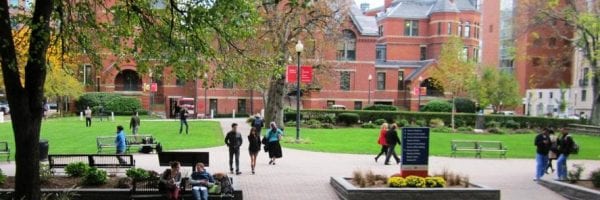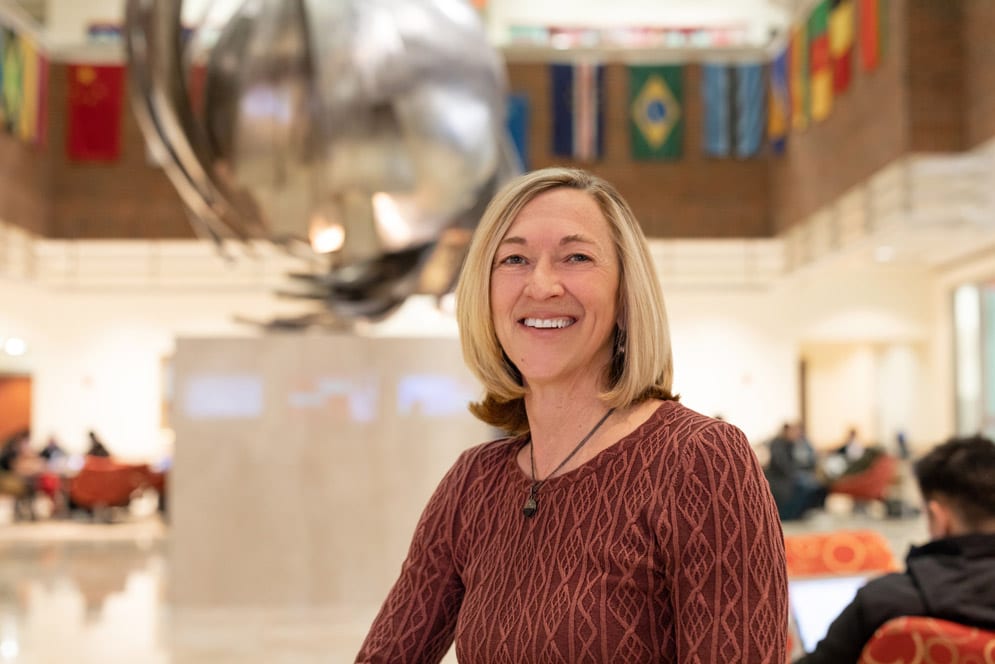Taking Action on Climate Change, and More – Boston News

Let’s explore some of the most interesting stories that have emerged from Boston business schools this week.
This Tool is Pushing People to Take Action on Climate Change – MIT Sloan Newsroom
New research from MIT Sloan Professor and Sustainability Initiative Director John Sterman finds that the role-play simulation World Climate, in which “participants take on the role of delegates to the UN climate change summits, and negotiate face-to-face with other participants to reach a climate change agreement,” might assist the powers that be understand and inspire environmental change.
Sterman and his co-authors write, “The results indicate that World Climate offers a climate change communication tool that enables people to learn and feel for themselves, which together have the potential to motivate action informed by science.”
“Research shows that showing people research doesn’t work. World Climate not only boosts people’s knowledge of climate change and increases the urgency they feel, but also generates gains in hope.”
You can read the full article here.
The Legacy of Boaty McBoatface: Beware of Customers Who Vote – HBS Working Knowledge
Harvard Business School Professors Michael Norton and Leslie John recently co-authored a new working paper about the pitfalls of crowdsourced naming competitions. Case in point: Boaty McBoatface, the winning entry for the National Environmental Research Council’s online voting poll to name the agency’s new research vessel.
When NERC overruled ‘Boaty McBoatface,’ there was massive public backlash. Professor Norton explains, “When firms conduct online polls, people frequently submit ridiculous entries; and with social media, those entries will go viral. But even when firms never guarantee that consumers will choose the winner, consumers infer an implicit contract and are upset when that contract is violated.”
The researchers incorporated the NERC case study into its research as a compelling example of how companies can potentially violate consumer trust in crowdsourced polls, according to John. “It’s offensive because consumers feel as though the firm broke the contract.”

In 2016, the National Environmental Research Council conducted a public poll to name its vessel. The winner, infamously, was Boaty McBoatface, but the council renamed it to the RRS Sir David Attenborough.
Norton and John offer a number of options that allow companies to safeguard against potential fallout from “off-the-wall choices” by being “very explicit about how they will consider the voice of consumers before the vote begins.”
The researchers also advise “pre-selecting acceptable outcomes on which consumers can vote, culling options from consumer suggestions without publicizing the actual number of votes for each, [or] setting up some kind of screening process, by which only actual customers can vote, but giving out a voting code attached to products.”
You can read more from Norton and John here.
From Building on Bones to Building on Blockchains: D’Amore-McKim Students Experience Russia – DMSB Blog

Marina Hess DMSB21 and Anya Losik COS21 pose at the border between Europe and Asia
The D’Amore-McKim School of Business at Northeastern University recently profiled 16 students who took part in a month-long Russian study abroad trip entitled “Driving Growth in Russia: From Building on Bones to Building on Blockchains.”
Yuan Vu Dinh Van (DMSB ’21) broke down the major takeaways from the cross-country excursion.
“By visiting Russia, I was able to see a different way of doing business compared to the model used in the U.S. Business in Russia seems to be conducted similarly to that of Ecuador, as only the people with the contacts and the money succeed in business, while in the U.S. it is easier for anyone to do that.”
Van adds, “I also learned about different ways to manage people, as Russian employees often prefer to be given orders and don’t have as much freedom as U.S. employees typically have in regards to the decision making. It really opened my mind to how important the role culture plays in doing business in different countries.”
You can read more from the interview here.
Meet Boston Questrom’s First Female Dean, Susan Fournier

What does it take to be the first female dean at your business school? It takes a lot of experience, know-how, and pioneering research. That’s precisely why Boston University’s Questrom School of Business choose Susan Fournier to be the first female to lead the school. After 13 years as a marketing and management professor at BU and as a leading international expert on brand marketing, she was an obvious choice.
“She brings a remarkable tool kit of experience and knowledge to this role—and a genuine connection to the students, faculty, and staff, who are the heart of Questrom,” Jean Morrison, BU Provost and Chief Academic Officer, told BU Today. “I am excited to welcome her to this role and to follow her success as she guides Questrom to continued excellence as a leading global business school.”
Meet Susan Fournier

Susan Fournier, Questrom Professor in Management, will become the new dean of the Questrom School of Business, effective August 27. Fournier is an international expert in brand marketing / Photo by Dan Watkins
Dean Fournier is well known at Boston University and in the field of marketing. She’s credited with pioneering brand relationships; a marketing field that explores the emotional relationships between consumers and brands. Fournier has written two acclaimed books on branding as well as participating in numerous best-selling Harvard case studies. Most recently, Fournier’s soon-to-be-published paper examines the pitfalls of celebrity-based branding, focusing on Martha Stewart’s 14-year career.
Fournier’s research has received several awards including the JRC Long-Term Contribution Award from the Association for Consumer Research as well as Emerald Publishing’s Citation of Excellence Award for the top 50 articles in management. Other awards include being ranked among the Top 10 percent of authors on SSRN regarding all-time downloads. She also claims over 20,000 Google Scholar citations with five works garnering over 1,000 citations each.
On her new role, Fournier sees a strong correlation between research specialties and her position as dean. They’re both about relationships.
“I have deep knowledge in the psychology and sociology of relationships, how they develop, how they fall apart, what kind of flavors they come in,” she says. “The whole point of what I do is looking at why people connect with things, what role brands, products, organizations have for people in their lives. It’s not about selling a product, it’s about understanding people’s lives … and trying to help them.”
Beyond her research, Fournier is a celebrated professor with over 24 years of experience in academia covering the gambit from teaching undergraduate courses to teaching in MBA and Executive classrooms at such prestigious schools as Harvard Business School, Dartmouth College’s Tuck School of Business, and Questrom.
Before her new role as Dean, Fournier served as the Senior Associate Dean of Faculty & Research and Faculty Director of the Questrom MBA and Doctoral programs. During that time, she hired 22 tenure-track research faculty and 18 non-tenure track faculty across disciplines and departments.
Outside of academia, Fournier worked as a market research consultant for companies such as Polaroid Corp., Altria, IBM, Coca-Cola, and Chick-fil-A, according to the Boston Globe.
What To Expect
“I will be the champion of the Questrom School of Business brand,” Fournier tells BU Today. “I will be looking out to make sure all the decisions we make are on brand and are going to build our equity as a preeminent academic institution, from every person we hire to every course we develop to every institute we endow.”
Fournier has many exciting plans for Questrom. Not only will she work to increase interdisciplinary programming, but she’ll also ensure Questrom’s financial security and aligning coursework with student and employer needs. And her work has already begun breaking down outmoded silos in favor of interdisciplinary programming. She has helped eliminate boundaries in hiring, interfaces, and education in general.
“I’m trying to further establish our reputation as a preeminent research and teaching institution and develop our reputation for research that matters and faculty who care,” Fournier says. “We need strong partnerships with industry and organizations both to provide data for research that matters but also to be in partnership with us in the development of courses and projects that students would work on for hands-on learning. I have a stakeholder perspective from having worked and lived on the other side.”
Also, Fournier plans to focus on online and experiential learning, global partnerships, and practical and pragmatic research particularly in focus areas such as health, social impact, and digital technology. She sees these areas of the economy as important spaces to “double down” by hiring more faculty, building research institutes, and implementing new programs and concentrations.
Fournier told The Daily Free Press that she also plans to build more partnerships between faculty and research tracks in those areas. “We already have what I would consider to be a fantastic culture, but let’s further enable the collaborative culture, and in particular … interdisciplinary work and ideas and projects and partnerships,” she says.
High Expectations
As for what the Questrom School can expect its new dean? It’s an exciting time for the school, and University President Robert A. Brown gives her his enthusiastic support.
“Susan assumes the role of the dean of the Questrom School of Business during an exciting time for the school, for business education, and the University,” Brown told BU Today. “I look forward to working with her to continue the journey of increasing the quality and impact of the school’s education and research programs.”
And Fournier is excited as well, not just about being the first female dean at Questrom, but about being a great dean in general.
“We’ve never had a woman dean, and it’s definitely notable and wonderful,” Fournier told The Daily Free Press. “But I also would say that at the same time, I want to be known as a great dean, not first and foremost as a woman who happened to get a dean role. I’m really looking forward to the day when that doesn’t even have to be a question anymore.”
Find the original school press release about the Susan Fournier appointment here.
New MBA Jobs: BCG, Merck, Adobe and More

There are hot new MBA jobs that need to get filled each and every week all over the world. Here are a few new openings for entry level and advance positions at a range of companies, and don’t forget to check out the best new MBA jobs right here on MetroMBA every week.
Applications Down 4.5 Percent at HBS, But Applicant Quality Remains High

The release of the Harvard Business School (HBS) Class of 2020 profile statistics last week revealed that the Boston school—like many of its U.S. peers—saw a decrease in overall application volume, but median GMAT score and GPA remained unchanged from the prior year at 730 and 3.71 respectively. The admit rate, 11 percent, was also unchanged year over year. So though he was working from a smaller pool of 9,886 applicants (down from 10,351 last year), Managing Director of Admissions and Financial Aid Chad Losee did not sacrifice on quality.
Harvard Business School Application Slips for Class of 2020
HBS is one of many leading U.S. business schools to see application volume drop off in this most recent application cycle. A strong economy paired with concerns among international applicants about potential student and work visa challenges made for even more dramatic declines at schools like UNC Kenan-Flagler and Georgetown’s McDonough School, which reported double-digit drops of 18.3 and 16.2 percent respectively. Yield at HBS–which is to say the percentage of admitted students who chose to enroll–slipped from 91 to 90 percent. Still, HBS remains far and away the leader in this statistic.

Applications are down 4.5 percent at HBS, but declines across other U.S. MBA programs was much more apparent.
At HBS, the 4.5 percent application volume decline was spread between both international and domestic applicants. International students make up slightly more of the HBS class this year, 37 percent compared to 35 percent last year. They hail from 69 countries as compared to 70 for the Class of 2019.
Another interesting development is the increase in GRE takers among admitted students. A record-setting 15 percent of the incoming class got there on the strength of their GRE scores, up from 12 percent last year. It’s only in the past couple of years that schools have begun to disclose the percentages of students who submit GRE scores in lieu of GMAT scores, which used to be the gold standard. But at HBS and elsewhere, a growing number of applicants seem to be taking schools at their word that they are indeed test agnostic.
There were not a lot of major shifts elsewhere in the statistics for the newest HBS class. The percentage of women is down by one point, slipping from 42 to 41 percent. U.S. ethnic minorities remained constant year over year at 26 percent of the class. The average age also remains unchanged at 27.
Applicants from Private Equity, Tech, Increase
In terms of prior work experience, there were again few shifts from the prior year. Slightly more students came in from private equity/venture capital (16 percent, compared to 15 percent last year), tech (also 16 percent, up from 15), and government/non-profit (7 to 8 percent). These upticks correlate with small declines in students from industrial/heavy manufacturing and other services. Military veterans make up 5 percent of the Class of 2020, on par with the Class of 2019.
And in terms of what students in this year’s entering class studied as undergraduates, again HBS showed little fluctuation. Economics/business majors make up the largest portion—46 percent, up from 45 percent last year. STEM undergrads also increased one percentage point, from 36 to 37 percent. Humanities/social science undergraduates made up just 17 percent of the class, down from 19 percent last year.
To view HBS’s complete Class of 2020 profile, click here.
This article has been edited and republished with permissions from our sister site, Clear Admit.
Alumni Spotlight: Ray Dalio, Bridgewater Associates Founder, HBS MBA

For 40 years, investment firm Bridgewater Associates has managed portfolios and partnerships with a tremendous level of success. Today, the company manages about $160 billion for approximately 350 global clients, including public and corporate pension funds, university endowments, charitable foundations, supranational agencies, sovereign wealth funds, and central banks. Ray Dalio, Founder of Bridgewater Associates and Harvard Business School MBA grad, is a big reason for this success. Continue reading…
Analyzing Credit, Bargain Hunting and Harvard, and More – Boston News

Let’s explore some of the most interesting stories that have emerged from Boston business schools this week.
What an MIT Professor Learned Analyzing 1 Million Credit Card Offers – MIT Sloan Newsroom
MIT Sloan Professor of Finance Antoinette Schoar used her appearance on Sloan’s “Data Made to Matter” podcast to discuss what analyzing one million credit card offers revealed.
“What we seemed to find in our study is that the [credit card] offers that are offered to less educated people rely in their pricing much more on these additional fees. Late fees, over limit fees, maybe default APRs that switch on once you’ve had a default,” she says on the podcast.
Schoar adds, “While people that are more educated, their cards seem to rely much more on the quite straightforward features, like they are paying an annual fee, and they’re paying an interest rate, but they are relying much less on these late fees and over limit fees.”
She also offers this takeaway for consumers:
“The more companies can model our behavioral biases, the more they can use them in extracting rents from us or catching us in moments when we’re inattentive or when we are not necessarily focused enough on choosing the right credit card, the right mortgage, or any of these products.”
You can read the full article here.
Bargain Hunters Beware: A Store’s ‘Original Price’ Might Not Be After All – Harvard Business Week
In a new working paper, Donald Ngwe, a Harvard Business School Assistant Professor, found that the “original price” many retail stores advertise in relation to an item’s hot bargain rate is often completely made up. In fact, the practice is much “more common than shoppers might realize.”
Ngwe says, “They never even tried to sell the product at that price. Consumers could never have bought that product at that price even if they tried.”
On Amazon, for instance, he notes that almost every item has a “struck-out price, but if you look at the policy behind that price, it’s incredibly vague. This makes me think that the fake prices are working to mislead the customers who know the brand the least, and who have the least information about the brand, into making a decision they would not have made otherwise.”
Ngwe’s research found that if customers “were given verifiably fake prices,” it actually does not change people’s “evaluation of quality” since we have gotten so used to the practice.
He concludes, “My results show that customers don’t see through the ruse. Even in outlet stores where they might expect some level of false discounting, they are still very influenced by these signals.”
You can read Ngwe’s paper Fake Discounts Drive Real Revenues in Retail here or the original HBW article here.
From Sheet Music to Spreadsheets – Sawyer Business School Blog
Sawyer Business School recently profiled Craig Pellet, MST ’18, a classically trained composer who ended up with a career at Boston firm Back Bay, from a Craigslist ad he answered on a whim.
Ten years after joining the firm, Pellett feels he had a number of major gaps that made it difficult to “solve client issues” so he decided to pursue Sawyer’s Master of Science in Taxation degree to “give [him] better tools to approach every problem.”

Craig Pellet, Sawyer Business School, MST ’18 / Photo via suffolk.edu
“Music teaches you how to practice, be committed, and be focused. It puts you in the mind-set: I want to get good at this, but it’s going to take me 10 years. So it’s time to start chipping away at it,” Pellett tells the Sawyer blog.
Pellett ended up working with his tax policy instructor Professor Michaele Morrow on a research paper that explored the notion of eliminating S-corporations to make taxation more fair. Morrow described Pellett’s notion as “pretty radical.”
“I somewhat believed him but wanted to really see. So I asked him to run the numbers. Turns out, he was right.”
Their paper was recently published in trade publication Tax Notes.
You can read the full interview with Pellett here.
